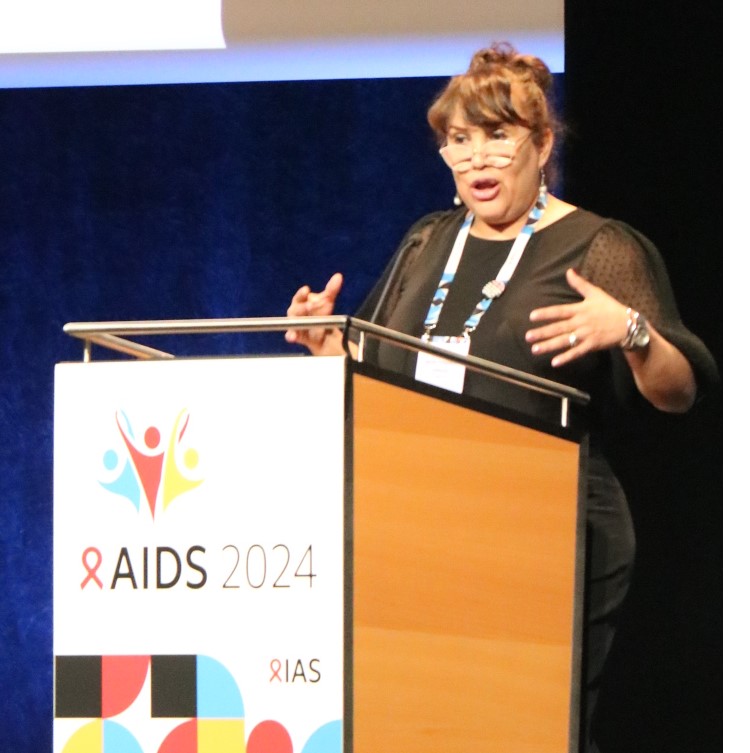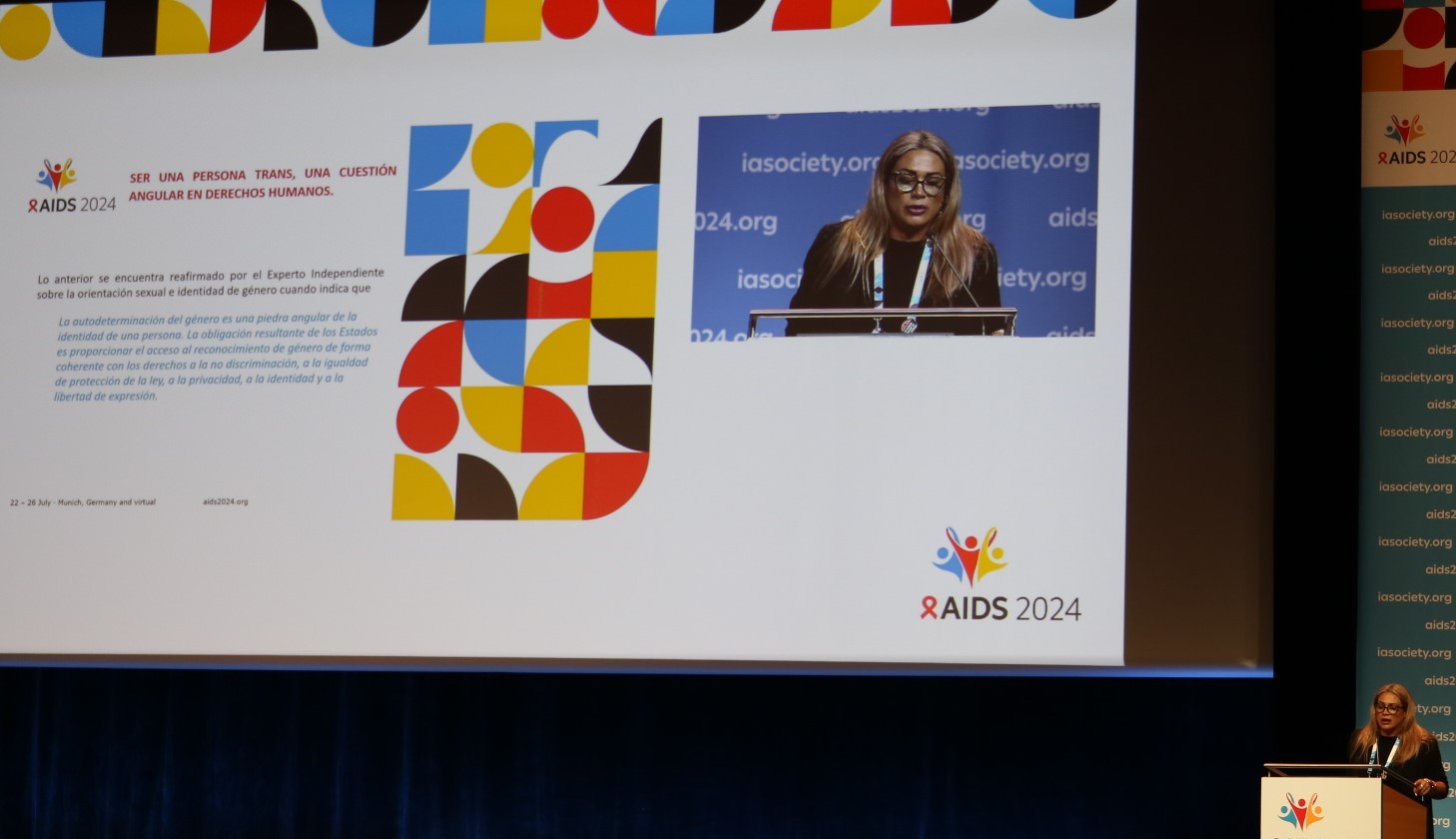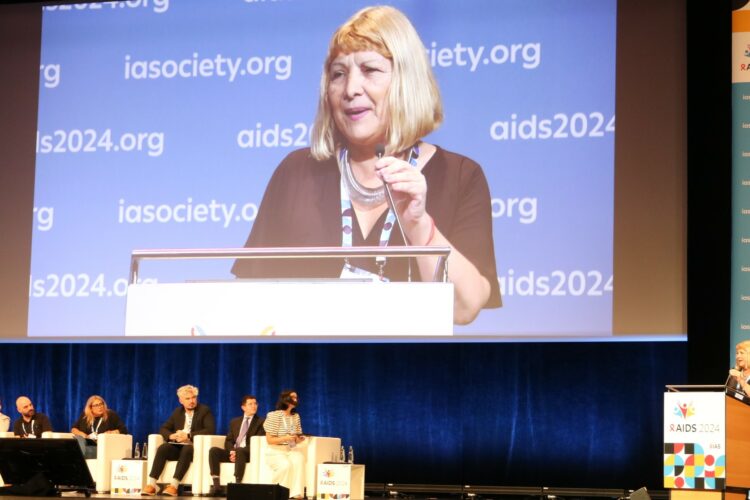22 July 2024 – Munich, Germany – To address the HIV crisis among trans communities in Latin America, “intersectionality is key”, stated several speakers at the Satellite Session Transgender in Latin America: Navigating intersectionality in transgender health at the AIDS 2024 Conference in Munich.

Nadir Cardozo, a trans woman and scientific researcher from Argentina, set the tone of the session by underscoring the critical importance of research centered on trans visibility and intersectionality. Stacy Velásquez Vasquez, from RedLacTrans Guatemala, reinforced the point by sharing how, in countries such as Guatemala, Honduras, and Costa Rica, trans individuals face life-threatening discrimination and hostility, highlighting the severe impact of prejudice and sociopolitical contexts on transgender health. “While the average life expectancy for cisgender people is around 65 years, trans individuals often do not live past 35,” Vasquez stated, emphasizing how trans people are robbed of their adolescence due to delayed legal gender affirmation from governments.

The impact of intersectional stigma on the mental health of trans people was highlighted, with alarming rates of discrimination (33%), suicide (26.5%), and self-injury (21.8%) found within trans communities. The data, cited by Pablo Radusky from Fundación Huésped from the TransCITAR study, involved 480 trans participants and found even higher rates of mental health impact among non-binary individuals. Radusky noted that police violence was found to be a recurring source of stigma and violence experienced by the community. For trans women living with HIV, this situation was found to be exacerbated by a higher probability of experiencing unstable housing, coming from a migrant background and holding less economic power.
Another factor impacting the mental health of trans communities includes a crisis in Chemsex—using illicit substances to enhance sexual experiences—with severe consequences from dating app use including higher rates of depression, suicide, and cardiovascular diseases. Thiago Torres from Fundação Oswaldo Cruz, Brazil highlighted the widespread exclusion of trans and gender diverse individuals from studies on Chemsex but noted that the limited existing research that included disaggregated data from trans communities indicated a higher prevalence among trans women and non-binary people in Latin America. The research found a notable correlation between PrEP (pre-exposure prophylaxis) use and higher instances of chemsex, prompting discussions on harm reduction strategies tailored for trans and gender diverse individuals.
The availability and acceptability of PrEP were found to be insufficient to meet the 2030 goal to end HIV, stated Diego Salusso, another speaker from Fundación Huésped. Studies indicated that the lack of implementation of national HIV prevention guidelines, accessibility issues related to center locations, transportation, and inconvenient service hours of HIV and PrEP services were particularly affecting trans sex workers in Latin America. “Usability and user-friendly environments are crucial for effective PrEP services,” Diego asserted, suggesting online appointments as one potential solution.
Providing insight into similar issues in other countries, Alex Keuroghlian from the Fenway Institute, USA, provided a stark overview of the deteriorating mental health status of trans and gender diverse individuals in the US amidst rising anti-gender attacks. He presented studies underscoring the necessity of gender-affirming care, particularly for trans youth, noting that those who began gender-affirming care at an early age have significantly better mental health outcomes in adulthood.
At the end of the session, Amanita Calderon-Cifuentes from TGEU raised a criticism regarding the lack of trans researchers from Latin America in a session titled “Transgender in Latin America.” In response, Nadir clarified that the session’s panelist selection did not reflect the inclusive research development process, which involved trans people from the outset. This criticism was recognized as part of a broader issue of ongoing exclusion faced by trans people in key research development and networking spaces.
In conclusion, the session called on an approach for navigating intersectionality in trans healthcare as a pathway to addressing the HIV crisis among trans and gender diverse communities in Latin America. To achieve this, an understanding of intersectional stigma and the provision of affirming, accessible and usable PrEP and HIV services tailored to communities’ needs would be required. Furthermore, there remains a need to address the ongoing exclusion of trans people in wider health-related research, with the conduction of comprehensive research on trans people and chemsex in order to understand the social implications of chemsex and its impact on HIV. The speakers collectively urged for systemic changes to dismantle barriers and foster an inclusive, supportive environment for trans communities in Latin America and beyond.





